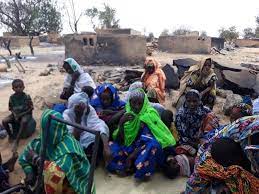APA-Bamako (Senegal) A United Nations independent expert said in Geneva on Thursday that he was “deeply concerned” by the dissolution of civil society organisations in Mali, and more generally by “growing restrictions” on human rights and fundamental freedoms.
Addressing the UN Human Rights Council, Alioune Tine, independent expert on the human rights situation in Mali, expressed his concern at the “severe closure of civic space and the systematic repression of freedom of expression and opinion, of the press, of peaceful assembly and association, as well as the worrying development of self-censorship,” according to a statement received by APA on Friday.
“Among other things, I note with concern the dissolution since December 2023 of several civil society organisations by the Government of Mali,” said Mr Tine, who was presenting his latest report in his
capacity as Independent Expert.
Increase in abuses
Since December 2023, at least four organisations have been dissolved, including the ‘Coordination des Mouvements, Associations et Sympathisants de l’Imam Mahmoud Dicko’ (CMAS) and the Observatory for
Elections and Good Governance in Mali.
In view of these restrictions, the expert urges the Malian authorities to guarantee full respect for and protection of freedom of expression and opinion, freedom of the press, freedom of peaceful assembly and freedom of association, in accordance with the constitution and lawscof Mali.
Generally speaking, Alioune Tine reports a “continuing deterioration” in the human rights situation and the protection of civilians.
According to recent reports, between 2022 and 2023, human rights violations and abuses increased by 85 percent. At the same time, abuses and violations of the right to life increased by 27 percent, and documented cases of gender-based violence increased by 12 percent.
Furthermore, between November and December 2023, the number of schools closed due to insecurity/humanitarian crisis increased by 2.59%. This situation deprives almost 495,000 children of their right to education, “a real social time bomb on the horizon.”
Security situation deteriorating
Turning to the security situation, Mr Tine reiterated his serious concerns about the “rapid and continuing deterioration of security in almost all the regions of Mali.”
These areas “seem to be slipping out of the control of the Malian authorities.”
The regions “are increasingly becoming a battleground for violent extremist groups, who are fighting for control to the great detriment of the civilian population, who are the main victims, caught between a rock and a hard place,” Mr. Tine said.
Although violent extremist groups continued to be the alleged perpetrators of the majority of violations reported in Mali, the expert expressed concern at the “high number” and “seriousness” of violations attributed to the Malian defence and security forces.
“In addition to the violations mentioned in my report, I have continued to receive allegations of human rights violations attributed to the Malian armed forces, sometimes accompanied by foreign military personnel,” Mr. Tine said, regretting the impunity for these acts.
Violations by jihadist groups
More generally, and despite the “real efforts made by the Malian authorities,” the situation remains very worrying, with attacks on civilians and the Malian defence and security forces by violent extremist groups such as the Support group for Islam and Muslims (JNIM), the Islamic State in the Sahel (EIS) and other similar groups,
as well as unidentified armed individuals whose modus operandi is similar to that of violent extremist groups.
Since December 2023, several cases of murder, injury, including by improvised explosive device, and kidnapping of civilians, as well as looting, robbery, extortion and destruction of property, have been reported during attacks by these groups in several localities in the north, centre and south of the country.
“Armed attacks, including against the Malian Defence and Security Forces, have recently been reported by the Malian authorities in several regions of the north, centre and south of the country, notably Segou (on 6 March 2024), Koulikoro (on 7 and 16 March 2024), as well as Gao, Koutiala and Sikasso (on 16 March 2024)”, Mr. Tine emphasised.
In view of this situation, he called on Bamako to take all appropriate measures as soon as possible to prevent attacks on civilians and strengthen their protection. Alioune Tine also urged the international community to step up its support for Mali in this area.
Bamako responds
Faced with the gloomy picture described by the independent UN expert, Bamako criticised the report for being “essentially incriminating and based on uncorroborated and exaggeratedly alarming information.”
In addition to the progress and successes achieved by the defence forces over the armed groups, the Minister of Justice, Mamoudou Kassogue, believes that this reality contrasts with the worrying security situation described in the report.
On the substance, the report points to a persistent challenge in the fight against impunity. On this subject, Mr Kassogué reiterated Bamako’s determination to put an end to impunity, in particular by “systematically opening investigations into every serious abuse reported to the competent authorities.”
With regard to political and institutional reforms, the Malian Minister of Justice referred to the “successful organization” of the constitutional referendum on 18 June 2023 and the promulgation of the new constitution on 22 July 2023.
“This is all part of the determination of the highest authorities to return to constitutional order,” the Malian Minister of Justice concluded.
TE/ac/fss/as/APA


